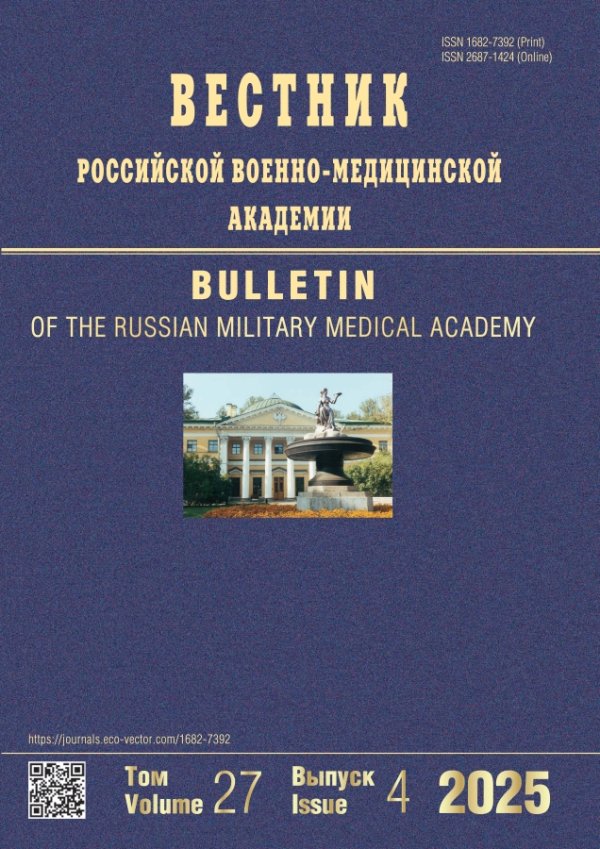Disease as a result of violations of the symbiotic relationship between the host and the microbiota with pathogens
- Authors: Tkachenko E.I.1, Grinevich V.B.1, Gubonina I.V.1, Kravchuk Y.A.1, Apcel V.Y.1,2, Ivanyuk E.S.1
-
Affiliations:
- Military Medical Academy named after S.M. Kirov of the Ministry of Defense of the Russian Federation
- Russian State Pedagogical University named after A.I. Herzen
- Issue: Vol 23, No 2 (2021)
- Pages: 243-252
- Section: Education news
- URL: https://journals.rcsi.science/1682-7392/article/view/58117
- DOI: https://doi.org/10.17816/brmma58117
- ID: 58117
Cite item
Abstract
Recent achievements in many sciences have led to an understanding of the need to form new ideas about the nature of human relationships with the environment and the inner world, his health, the principles of disease formation and their prevention. There has been a transition from a collection of achievements of various sciences to a holistic paradigm that unites a person as an organism and as a person, his inner and surrounding world. It became obvious that this could not be done within the framework of the previous general theories of medicine. To this end, the authors propose a new theory of medicine: "the theory of noospheric-anthropogenic harmony". From the standpoint of this theory, the mechanisms of the relationship of microbiota and pathogens with the protective and acceptive immunity of a healthy and sick person, as well as the mechanisms of microbiota regulation, are considered. The paradigm of dysbiosis as the cause of many diseases and main homeostatic mechanisms that provide symbiotic relationships of microbiota, immunity and its role in the mechanisms of natural tolerance and formation of various disease, such as, autoimmune ones and tumors, require a change in the acceptedtreatment and prevention. A new approach should be based on using a new class of drugs — metabiotics, which in their term influence microbiota.
Full Text
##article.viewOnOriginalSite##About the authors
Evgeny I. Tkachenko
Military Medical Academy named after S.M. Kirov of the Ministry of Defense of the Russian Federation
Author for correspondence.
Email: info@eco-vector.com
doctor of medical sciences, professor
Russian Federation, Saint PetersburgVladimir B. Grinevich
Military Medical Academy named after S.M. Kirov of the Ministry of Defense of the Russian Federation
Email: info@eco-vector.com
doctor of medical sciences, professor
Russian Federation, Saint PetersburgIrina V. Gubonina
Military Medical Academy named after S.M. Kirov of the Ministry of Defense of the Russian Federation
Email: info@eco-vector.com
candidate of medical sciences, associate professor
Russian Federation, Saint PetersburgYuriy A. Kravchuk
Military Medical Academy named after S.M. Kirov of the Ministry of Defense of the Russian Federation
Email: info@eco-vector.com
doctor of medical sciences, associate professor
Russian Federation, Saint PetersburgVasily Ya. Apcel
Military Medical Academy named after S.M. Kirov of the Ministry of Defense of the Russian Federation; Russian State Pedagogical University named after A.I. Herzen
Email: info@eco-vector.com
ORCID iD: 0000-0001-7658-4856
SPIN-code: 4978-0785
Scopus Author ID: 6507529350
ResearcherId: Е-8190-2019
doctor of medical sciences, professor
Russian Federation, Saint Petersburg; Saint PetersburgElena S. Ivanyuk
Military Medical Academy named after S.M. Kirov of the Ministry of Defense of the Russian Federation
Email: info@eco-vector.com
candidate of medical sciences
Russian Federation, Saint PetersburgReferences
- Ugolev AM. Trofologija — novaja mezhdisciplinarnaja nauka. Vestnik AN SSSR. 1980;(1):50–68. (In Russ.).
- Tkachenko EI. Teorija patologii vnutrennih organov, svjazannoj s terapevticheskimi infekcijami. Problemy teorii i praktiki obshhestvennogo i individual’nogo zdorov’ja v sovremennyh uslovijah: sbornik trudov SPbGMA im. I.I. Mechnikova. 1999;273–273. (In Russ.).
- Tkachenko EI. Nutrition, human endoecology, health, diseases. current views on their relations. Terapevticheskij arhiv. 2004;76(2):67–71. (In Russ.).
- Sitkin SI, Tkachenko EI, Vahitov TJa, et al. Serum metabolome and gut microbiota in ulcerative colitis and celiac disease. Vestnik Severo-Zapadnogo gosudarstvennogo medicinskogo universiteta im. I.I. Mechnikova. 2014;6(3):12–22. (In Russ.).
- Kiseleva EP. Akceptivnyj immunitet — osnova simbioticheskih vzaimootnoshenij. Infekcija i immunitet. 2015;(2):1–22. (In Russ.). doi: 10.15789/2220-7619-2015-2-113-130
- Klimovich VB, Samojlovich MP. Immunoglobulin A (IgA i ego receptory). Medicinskaja immunologija. 2006;8(4):483–500. (In Russ.). doi: 10.15789/1563-0625-2006-4-483-500
- Brandtzaeg P. Secretory IgA: Designed for Anti-Microbial Defense. Front Immunol. 2013;6:4:222. doi: 10.3389/fimmu.2013.00222
- Macpherson AJ, Geuking MB, McCoy KD. Homeland security: IgA immunity at the frontiers of the body. Trends Immunol. 2012;33(4):160–167. doi: 10.1016/j.it.2012.02.002
- Pabst O. New concepts in the generation and functions of IgA. Nat Rev Immunol. 2012;12(12):821–832. doi: 10.1038/nri3322
- Hill DA, Artis D. Intestinal bacteria and the regulation of immune cell homeostasis. Annu Rev Immunol. 2010;28:623–667. doi: 10.1146/annurev-immunol-030409-101330
- Honda K, Takeda K. Regulatory mechanisms of immune responses to intestinal bacteria. Mucosal Immunol. 2009;2(3):187–196. doi: 10.1038/mi.2009.8
- Smith PD, Smythies LE, Shen R, et al. Intestinal macrophages and response to microbial encroachment. Mucosal Immunol. 2011;4(1):31–42. doi: 10.1038/mi.2010.66
- Johansson MЕ., Larsson JM, Hansson GC. The two mucus layers of colon are organized by the MUC2 mucin, whereas the outer layer is a legislator of host-microbial interactions. Proc Natl Acad Sci USA. 2011;15:(Suppl. 1):4659–4665. doi: 10.1073/pnas.1006451107
- Hooper LV, Stappenbeck TS, Hong CV, Gordon JI. Angiogenins: a new class of microbicidal proteins involved in innate immunity. Nat Immunol. 2003;4(3):269–273. doi: 10.1038/ni888
- Stappenbeck TS, Hooper LV, Gordon JI. Developmental regulation of intestinal angiogenesis by indigenous microbes via Paneth cells. Proc Natl Acad Sci USA. 2002;26:99(24):15451–15455. doi: 10.1073/pnas.202604299
- Brown EM, Sadarangani M, Finlay BB. The role of the immune system in governing host-microbe interactions in the intestine. Nat Immunol. 2013;14(7):660–667. doi: 10.1038/ni.2611
- Domaradskij IV, Hohoev TH, Kondrakova OA, et al. Protivorechivaja mikrojekologija. Rossijskij himicheskij zhurnal. 2002; HLVI(3):81–88. (In Russ.).
- Shenderov BA. Funkcional’noe pitanie i ego rol’ v profilaktike metabolicheskogo sindroma. Moscow: Deli print; 2008; 319 р. (In Russ.).
- Stehin AA, Jakovleva GV, Iksanova TI, et al. Voprosy elektronnoj kinetiki organospecificheskih preparatov. Teorija i praktika primenenija innovacionnyh nelekarstvennyh preparatov PawerMatrix v sisteme profilaktiki i integrativnoj mediciny: Sbornik materialov I i II mezhdunarodnoj nauchno-prakticheskoj konferencii. Moscow; 2018:6–18. (In Russ.).
- Shenderov BA, Tkachenko EI, Lazebnik LB, et al. Мetabiotics — novel technology of protective and treatment of diseases associated with microecological imbalance in human being. Eksperimental’naya i klinicheskaya gastroenterologiya. 2018;151(3):83–92.
Supplementary files








